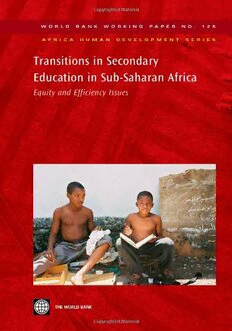
Transitions in Secondary Education in Sub-Saharan Africa: Equity and Efficiency Issues (World Bank Working Papers) PDF
86 Pages·2008·0.626 MB·English
Most books are stored in the elastic cloud where traffic is expensive. For this reason, we have a limit on daily download.
Preview Transitions in Secondary Education in Sub-Saharan Africa: Equity and Efficiency Issues (World Bank Working Papers)
Description:
Transitions in Secondary Education in Sub-Saharan Africa is part of the World Bank Working Papers series. These papers are published to communicate the results of the Bank's ongoing research and to stimulate public discussion. This working paper discusses equity and efficiency issues in secondary education transitions in Sub-Saharan Africa. Its main purpose is to identify and analyze national, regional, and local measures that may lead to the development of more efficient and seamless transitions between post-primary education pathways. In most African countries student transition from primary to junior secondary is still accompanied by significant repetition and dropout. Transitions within the secondary cycle also cause significant losses and should use more effective assessment and selection methodologies. According to global trends, Africa needs to revisit its post-primary structures to provide more diversified (academic and non-academic) pathways of learning which respond better to the continent??s present economic and social realities. In the end, the main goal should be to produce young people who can become productive citizens and lead healthy lives, as demonstrated by middle and higher-income economies. This study was prepared as part of the Secondary Education and Training in Africa (SEIA) initiative which aims to assist countries to develop sustainable strategies for expansion and quality improvements in secondary education and training.
See more
The list of books you might like
Most books are stored in the elastic cloud where traffic is expensive. For this reason, we have a limit on daily download.
